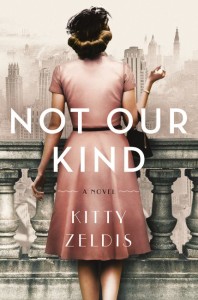
Anti-Semitism Among the WASP Elite
The idea for my novel Not Our Kind was born at Vassar College, where I was a student in the 1970s, where there was enough visible diversity to make a Jewish girl feel she was not alone. I encountered plenty of Jews, both students and faculty. Yet while I didn’t experience much overt anti-Semitism, I felt keenly aware that Vassar had historically excluded people like me—I was the “not our kind” of my eventual novel’s title.
I could feel it in the manners, the mores, the very air around me. Vassar was a WASP institution and bastion, and I knew I didn’t entirely belong. In fact, it was at Vassar that I acquired the nickname that became my pen name. I had commented to a friend that my Hebrew first name and Polish surname felt all wrong and that I should have been called Katherine Anne Worthington; he jokingly responded by calling me Kitty. It’s a name that stuck.
The anti-Semitism at Vassar was occasionally overt— my freshman roommate casually noted, “Well, your people did murder our Lord,” a remark for which I then had no ready reply. But it was the more passive, almost nonchalant anti-Semitism that stung most. I remember an English lit class in which we’d been reading Ezra Pound and T.S. Eliot and I said that I found the stereotypical characterizations of Jews in their poetry—greedy, money-grubbing, hook nosed and so forth— upsetting. A fellow student raised his hand and said, “Oh, well, that’s what everyone was like back then,” as if that should have cancelled out my discomfort, and made it, somehow, all right. And then there was the memorable evening that I went to hear a lecture on 18th century Rococo painting that was to be given by a well-regarded scholar visiting from Germany. Before he came to the lectern, someone from the Art History department read a short bio by way of introduction. I don’t know what I expected to hear, but it surely wasn’t that during World War II, this man had been a high ranking official—a commander, a general, I don’t recall which—in the military. A Nazi, in other words, though the word was not actually said.
my freshman roommate casually noted, “Well, your people did murder our Lord,” a remark for which I then had no ready reply. But it was the more passive, almost nonchalant anti-Semitism that stung most. I remember an English lit class in which we’d been reading Ezra Pound and T.S. Eliot and I said that I found the stereotypical characterizations of Jews in their poetry—greedy, money-grubbing, hook nosed and so forth— upsetting. A fellow student raised his hand and said, “Oh, well, that’s what everyone was like back then,” as if that should have cancelled out my discomfort, and made it, somehow, all right. And then there was the memorable evening that I went to hear a lecture on 18th century Rococo painting that was to be given by a well-regarded scholar visiting from Germany. Before he came to the lectern, someone from the Art History department read a short bio by way of introduction. I don’t know what I expected to hear, but it surely wasn’t that during World War II, this man had been a high ranking official—a commander, a general, I don’t recall which—in the military. A Nazi, in other words, though the word was not actually said.
One comment on “Anti-Semitism Among the WASP Elite”
Comments are closed.




At our most recent quarterly salon in Princeton, we discussed the article “Five Recent Encounters: or “One of Those People”. I have found, as someone who converted to Judaism 32 years ago, that the experience of “Not Our Kind”, being the other, cuts both ways. Every time I hear that something is WASPy or goyishe (both terms came up in different conversations I was a part within the past month), I feel my difference. I am reminded, as I’ve often said, that MY grandmother made Rice Krispie Treats, not kugel.